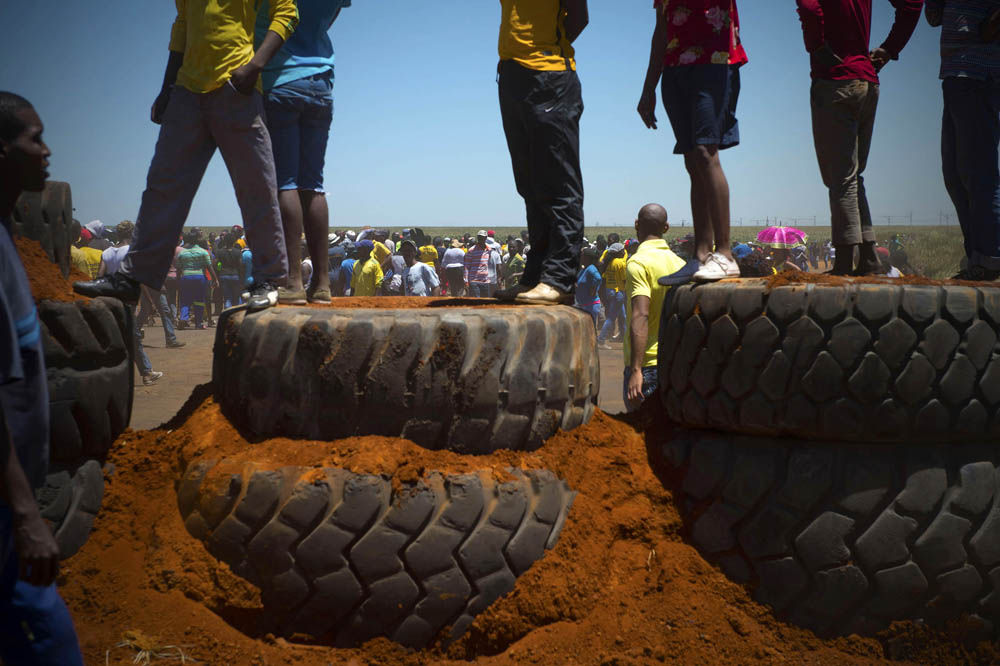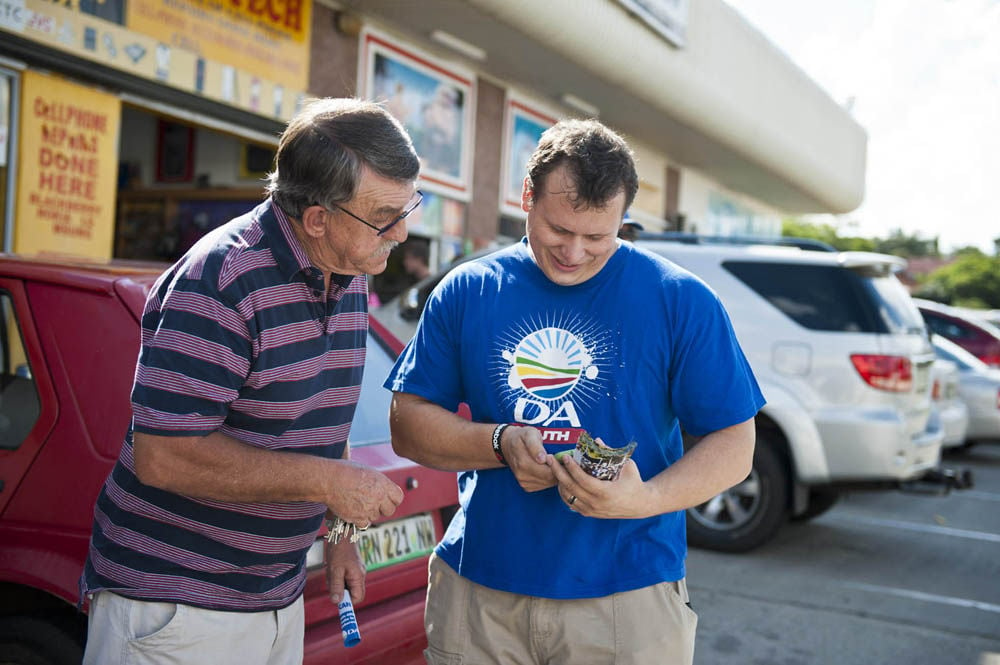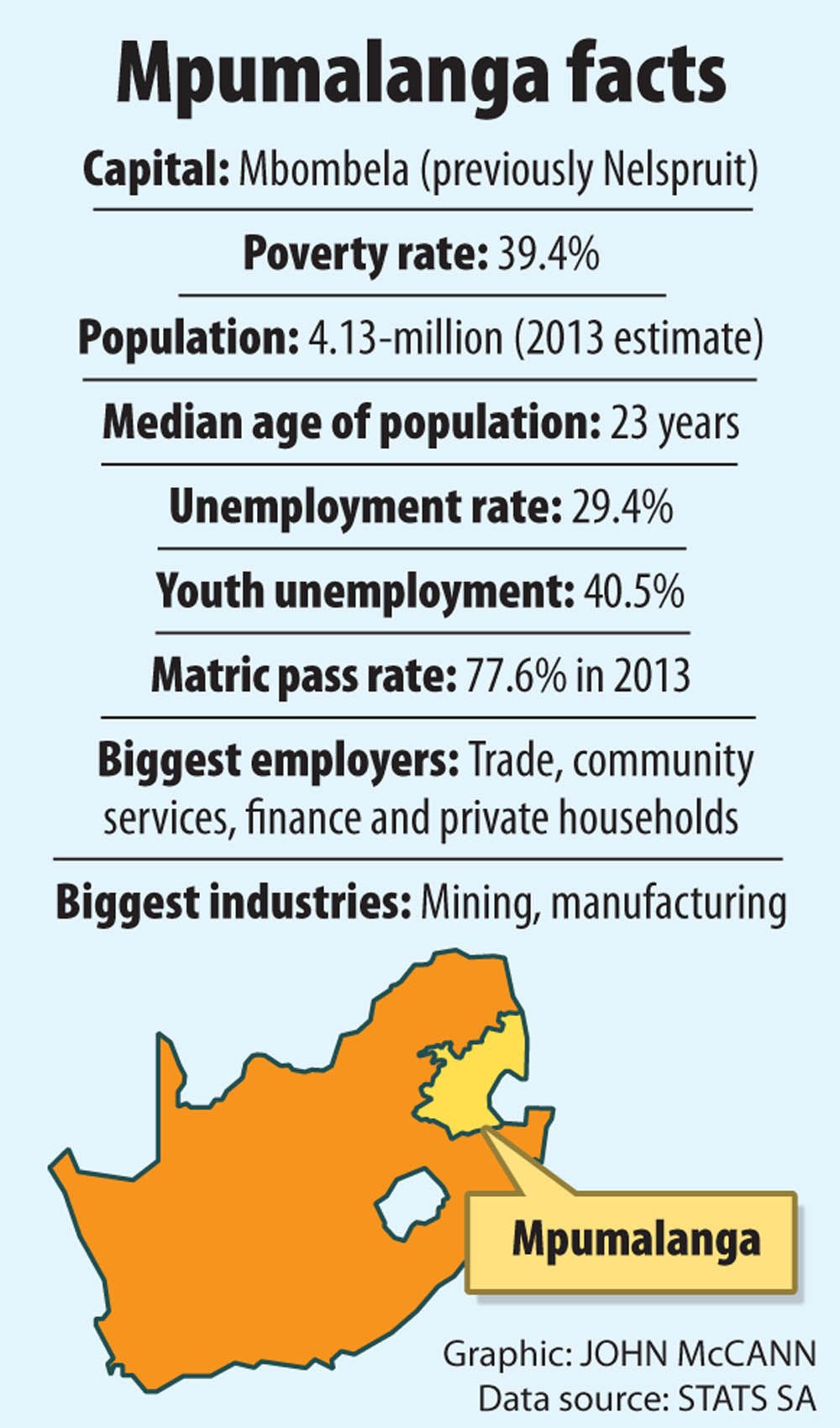Thousands of supporters turned out for the launch of the ANC's manifesto in Mpumalanga in January.
A solitary Agang SA poster hangs on one of the many bridges arching over the N4 as you enter Mpumalanga: Mamphela Ramphele, beatific in white, stands with arms raised, beneath the words "dignity, hope, equality", a would-be version of Delacroix's Liberty leading South Africans to their own revolution. It flaps once, twice, as the traffic roars beneath, and then it is gone, rarely seen again.
Instead, blue or yellow dominates the Lowveld's street poles, with the governing ANC and opposition Democratic Alliance (DA) vying for attention in the province in the final weeks before the country's national election on May 7.
The two parties went head to head at rallies on Wednesday last week.
Outside the Adelaide Tambo community hall in Mhluzi, photographs of the DA's Lindiwe Mazibuko are emblazoned on party buses.
Inside the hall, she is speaking, seemingly the only person in the 400-strong group not wearing a blue shirt.
Afterwards, four members of the audience all say they are disillusioned former ANC supporters, weary of empty promises and the lack of jobs, and that they have been won over by the DA.
All sewn up
But there is no competition, really. The ANC has the province sewn up. With 85.8% of its population voting for the ruling party in the general elections in 2009, it's no surprise that this is where the ANC held its manifesto launch and issued its January 8 statement earlier this year.
Party secretary general Gwede Mantashe is so confident of unwavering ANC support that his community meeting last Wednesday near Ogies started two hours late and he then lectured the more than 700-strong audience on demonstrating peacefully and not destroying government property.

Dismal education standards deprive the majority of the province's youth of a decent future. (AFP)
At the centre of this ANC stronghold is the province's premier and ANC chairperson, David Mabuza, whose critics include the DA, the newcomer Economic Freedom Fighters (EFF) and even members of his own party who have been ousted from party positions. This widely disparate group of critics has one thing in common: a belief that Mabuza is bad news for the province.
"Democracy has become a contest for patronage in the ANC, where the choice now is not which party makes it to government but which faction makes it to government," the DA's leader in the province, Anthony Benadie, said, referring to access to government funding, contracts and employment.
"Mabuza has become a respected figure in the province because of the patronage that he dispenses."
Mr Twenty percent
Collen Sedibe, the EFF leader in the province, said: "Every tender that Mabuza gives to a company is because he gets a share; that's why he's called Mr Twenty percent."
Sedibe was a rising star in government, where he worked for 14 years, but he resigned early this year to join the EFF. He claims to have seen much corruption in government.
Mabuza has gained a reputation of working his potential challengers and critics out of jobs. According to the party's list, which gives an indication of the prospective provincial cabinet after the elections, some legislators who have served several terms in the provincial legislature, and even as MECs, have been ousted apparently in favour of men and women understood to be loyal to Mabuza.
The deeper one digs into the province, the darker the claims become.
Three former allies and senior government figures separately told the Mail & Guardian how Mabuza had allegedly engineered tender processes to his own benefit, ensuring that his network of preferred businesses got contracts. Politicians or bureaucrats who took issue with the manipulation were apparently worked out of the system.
Old hat
But the ANC in the province says the claims are nothing new, and that the government has already taken action.
"We have established an integrity committee in the premier's office that does investigations into all these allegations," the ANC's provincial secretary, Lucky Ndinisa, said.
Mabuza himself has pooh-pooed these claims in the past through his spokesperson, calling it "cheap politicking". He was not immediately available to comment.
But for him, Ndinisa and the rest of the party in the province, theirs is a good story, to use the slogan of the current ANC election campaign.

Despite poor services and fierce campaigning by the DA, the ANC expects to maintain
its iron grip. (Delwyn Verasamy, M&G)
Some of the key indicators quoted by Mabuza in his state of the province address in February this year do show an upward trend. Economic growth has improved in the province, which has spent R12.2-billion over the past five years to improve the road network and social and economic structures. The percentage of people living in poverty decreased from 43.7% in 2009 to 36.9% in 2012, and income inequality decreased slightly in the same period.
Challenges
Ndinisa, too, describes the strides made in housing, rural development and education but he is aware of some of the challenges.
"We have a serious challenge in terms of water provision, in rural and urban areas."
Then there is the issue of the political killings that the province is notorious for. Whistle-blowers have been murdered, after having raised the alarm about possible corruption.
Ndinisa takes it seriously. "It is still a mystery from where I'm standing [of] whether [it] is really a political assassination or not. But a crime is a crime and it must be given the necessary attention it deserves, so that whoever is perpetrating it must be brought to book and dealt with severely."
The factional battles in the province also often translate into poor service delivery, with dire consequences for the province's population of just more than four million.
Unemployment
Nearly 43% of the province's workforce was unemployed at the end of 2011, according to the Provincial Economic Review and Outlook for 2012-2013. This included those who had given up looking for work and it was far higher than the national average of about 36% at the time.
Mpumalanga is a jewel of a province, blessed with natural beauty, rich mineral resources and a flourishing tourism industry. The province is home to the Kruger National Park, one of the largest game reserves in Africa, and it has 11 coal-fired power stations, which provides the bulk of South Africa's electrical power.

But many of its people are not sharing that wealth.
A lot of this has to do with education. The recent establishment of the province's first university is cause for excitement but 14.2% of Mpumalanga residents over the age of 20 have not received any schooling. And future generations don't have much hope as the quality of basic education in the province is dismal.
In mathematics and languages, its pupils of all grades scored below the national average in 2012. Out of the nine provinces, Mpumalanga ranked seventh or lower in nearly all grades for the two subjects. This is due in large part to the poor quality, or absence, of teaching.
Stuff of legend
The shortage of medical staff is also the stuff of legend. The South African Institute of Race Relations found in its 2012 survey that 47% of doctors' posts and 27% of nursing positions were not filled.
"A massive proportion of our health system is completely dependent on community service doctors who are extending themselves way beyond their expertise and human ability to keep Mpumalanga hospitals intact," Benadie said.
Will a Lady Liberty emerge to lead the people of Mpumalanga to a more egalitarian democracy?
It is unlikely. The province is firmly under the control of the ANC and Mabuza. For a more volatile election race, you'll have to drive in the opposite direction on the N4 towards Gauteng – with a more colourful array of election posters and more competition for the ruling ANC.